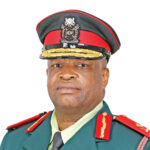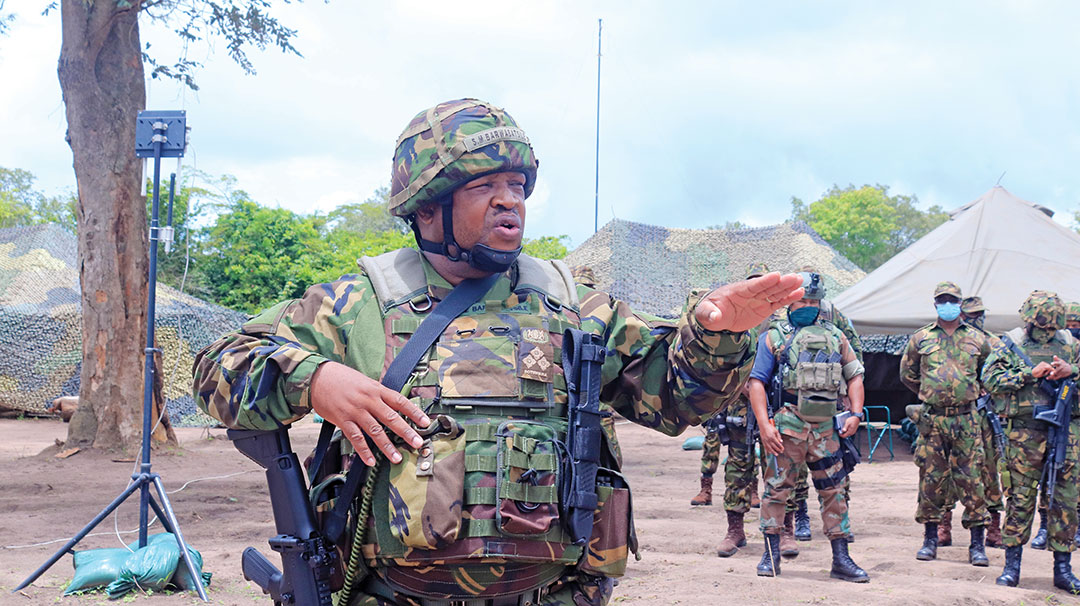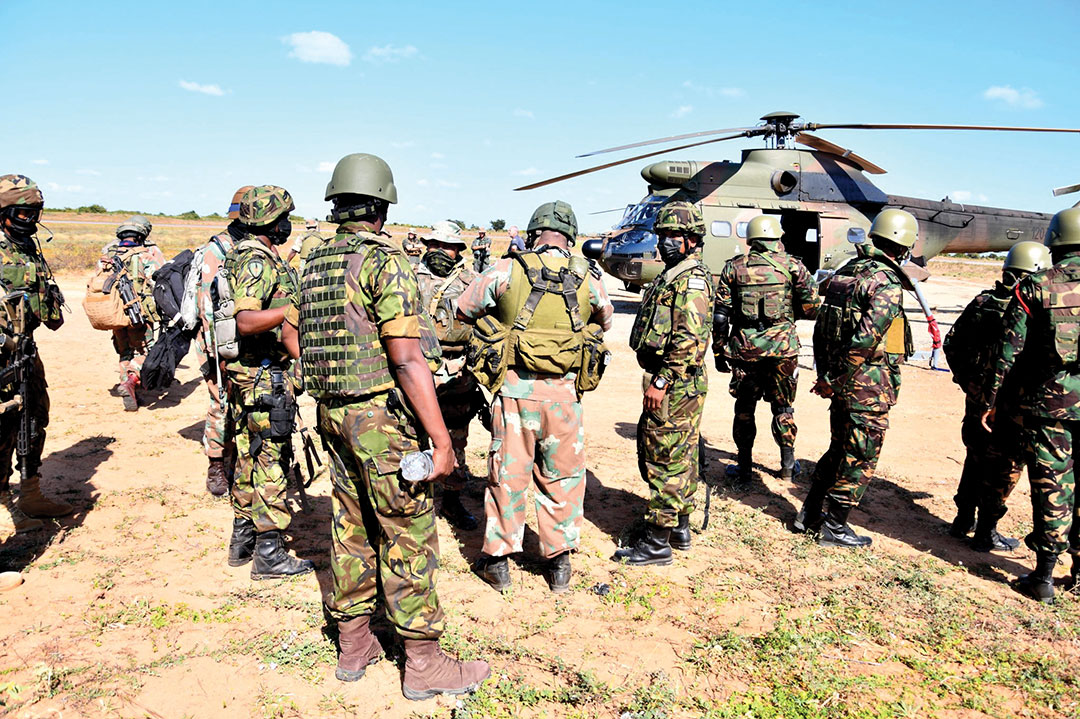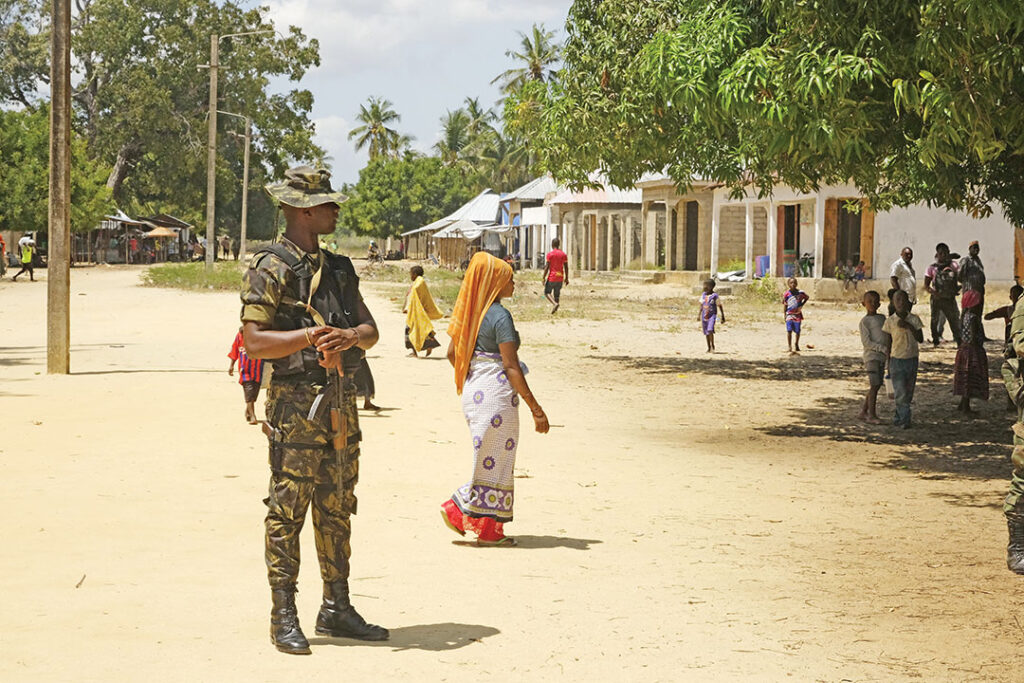ADF STAFF
 Maj. Gen. Simon Motswana Barwabatsile is commander of Ground Forces Command and is Joint Force commander for the Botswana Defence Force (BDF). He joined the BDF in March 1989 and rose through the ranks as a commander of armored units. In 2015, he was promoted to brigadier as an armored brigade group commander. He was named major general in September 2023 and assumed his current BDF commands at that time. He served in the 1993 U.S.-led humanitarian operation known as Restore Hope in Somalia, and he served in the Southern African Development Community Mission in Mozambique from February to November 2022 as deputy force commander, acting force commander and as acting head of mission. Barwabatsile spoke to ADF at the African Land Forces Summit, held April 22 to 26, 2024, in Livingstone, Zambia. The interview has been edited for space and clarity.
Maj. Gen. Simon Motswana Barwabatsile is commander of Ground Forces Command and is Joint Force commander for the Botswana Defence Force (BDF). He joined the BDF in March 1989 and rose through the ranks as a commander of armored units. In 2015, he was promoted to brigadier as an armored brigade group commander. He was named major general in September 2023 and assumed his current BDF commands at that time. He served in the 1993 U.S.-led humanitarian operation known as Restore Hope in Somalia, and he served in the Southern African Development Community Mission in Mozambique from February to November 2022 as deputy force commander, acting force commander and as acting head of mission. Barwabatsile spoke to ADF at the African Land Forces Summit, held April 22 to 26, 2024, in Livingstone, Zambia. The interview has been edited for space and clarity.
ADF: What is your top priority as the commander of Ground Forces Command?
BARWABATSILE: I think what is important, first and foremost, is to invest in the human resource. The human capital is our key capability. In terms of professional military education and training, we need to invest in them, develop all the necessary skills that are akin to land forces capability — specialists, the infantry, armor, artillery, air defense, and then the specialist ones like engineers, reconnaissance capabilities. We must develop them to the cutting-edge level so that they can work in unison.
And then develop capabilities in terms of combat-ready units and then equipping them properly, starting with the individual Soldier, especially in individual force protection, because, as you know, the contemporary operating environment is infested with lethal assets, especially when you talk about terrorism. We need to have force protection both at the individual level and at the unit level.
ADF: What actions have you taken in pursuit of those priorities so far?
BARWABATSILE: I think I can say, thanks to my predecessors, they have already started working in some of these areas, and it is for me now to build into them. As we speak, we currently have work going on in terms of specialist training, so we need to build into that and then move into building teams — combat-ready teams, combat-ready units — that can fight together effectively.

BOTSWANA DEFENCE FORCE
ADF: Several years ago, as a brigadier, you oversaw counterpoaching operations in Botswana. What is the current state of poaching and wildlife crime in Botswana, and what is the BDF doing to fight it?
BARWABATSILE: Throughout the country we have centers where we have interagency coordination teams working together, sharing information in the shortest possible time. And we have not only done this within our country; we have also built collaboration, cooperation and relationships with our neighboring states, to the extent that we are able to share information with ease in the shortest possible time. It is a game of time when it comes to these issues of poaching. If you hear of the intent to move to targeted areas in time, you are able to intervene. And that we are getting, especially from our neighboring countries, who are facing the same challenge.
ADF: You spent time as the deputy commander of the Southern African Development Community Mission in Mozambique, known as SAMIM. What did you learn in that role that helps you now as BDF commander of Ground Forces Command?
BARWABATSILE: I think because those are now matters of operations, it’s a good thing that as I take command of the Ground Forces Command, I am also becoming the Joint Force commander. And I have been the chief of staff to the Joint Force commander as a brigadier. I was involved in the initial preparation and projection of forces into SAMIM. What was key was readiness. What we can all agree on is that there is a need to mechanize to ensure that force protection is guaranteed in theater. All the forces that we have been deploying, we made sure that they move with protected vehicles, and protected vehicles are key in this undertaking.
I think now, having been in the theater, I have taken note of the fact that the multinational collaboration, cooperation, even before going into theater, is very critical. We need to find ways and means of constantly training in exercises, through education. Our Soldiers, our land forces, should work with other land forces to prepare for defense and security of our region. I think the other issue that we also saw is our professional military education institutions like staff colleges. We need to increase in terms of exchange students, we need to increase in terms of exercises, joint exercises, because when we talk of the staff college, the officer who comes out of that is the key planner. When you talk about majors, these are the key planners at levels of brigade units, and they are definitely going to be there in theater. They need to be prepared for this multinational engagement.
As you go forward, also the gap of technology becomes apparent. We need to make the theater transparent in terms of what we’re seeing, sensing. And we need to invest in the ISR — intelligence, surveillance and reconnaissance — capability. The threat that we were facing is elusive, but when they are out of contact with communities, we should be able to detect them and be able to target when they are out. And that can only be done with good ISR and harnessing technology.
Build on the ability to work within communities in terms of civil-military cooperation, build on that aspect. We need to work hard on it to make sure that when we deploy into operations, we are ready to carry out civil-military operations. That way they will be able to see us as partners and be able to even give information willingly without having to be requested regarding what is happening inside the community in terms of security threats.

ADF: Botswana has been a nation at peace internally and with its neighbors for many years now. What practices or philosophies have allowed Botswana to stay at peace for so long in an often-volatile region?
BARWABATSILE: I think the question is a political question. But as a military, we have to be as professional as we can in the provisioning of the security, which is our sovereign responsibility and our obligation as a military institution. Discipline and professionalism should be the guiding principles for our forces. I think security is as good as the provider of it.
ADF: As BDF ground forces commander, how do you assess the level of cooperation from your regional partners? How essential is that cooperation to regional security?
BARWABATSILE: I think the fact that they agreed to undertake the [SAMIM] mission and the fact that the host nation agreed to accept the mission, it is telling in its own right that there is cooperation. Unfortunately, we cannot contribute to the same degree, because we have different challenges. A point to note is that we went into this mission under the shadow of COVID-19, which has hit hard in our economies, and any contribution to me is sufficient. There are countries that contributed forces. There are those who contributed assets. There are those who contributed staff officers only, not standing forces or formed troops, and there are those who contributed in assisting with intelligence, and those that contributed morally. I believe all of them contributed. If you look at the number of the players, it’s more than 50% of membership. To me, that is a success for a first-time mission of its kind.
ADF: We live in an ever-changing world technologically. How is the BDF leveraging military technology in its training and during its deployments?
BARWABATSILE: I think we are working on that. Our endeavor is to have a small but agile and effective task force, but this can only be achieved by harnessing technology. There is no other way around it, and we need to continue to move in that direction. In this current operation that we referred to, we were mostly, while we had the combat troops, we also had the ISR capability, which was an enabler and a force multiplier, because it was giving us the necessary intel and the necessary reconnaissance, the necessary sensing that we needed. Those are some of the areas that we have tried to harness into technology, and I think we will continue to do so, especially in the drone/UAV area.
ADF: To what extent are the BDF ground forces using drones, and has that been successful?
BARWABATSILE: We are using the drones in the ISR responsibilities. Where we have used them, it has paid dividends. But we need to build more in that capability. It’s very limited. I think the Mozambique Cabo Delgado theater has shown the need for this and for us previously, even from our history in terms of the antipoaching, it has shown the necessity and the need to have those things. You can’t have troops everywhere, but if you have technology, it can cover those gaps.
ADF: What do you see as the future of the BDF ground forces? What do you see coming in the next few years for your force?
BARWABATSILE: The brigades are fundamental or the basis of the ground force. And it is those who have been engaged that we need to crystallize them and equip them. We cannot fully equip them, but we should equip them to levels that their capabilities, and we are able to generate capabilities that may be required in national or in multinational undertakings. We should be able to prepare for that.
ADF: Is there anything that you would like to add?
BARWABATSILE: I think what I can add is just that the need to make sure that we have professionalism across all these spheres, all these spheres within the ground force and ensure force protection. Force protection is crucial because from the SAMIM experience, if it was not for force protection in terms of the equipment that we give our troops, we may have lost more than what we lost. Because there was force protection, we managed to save lives.

